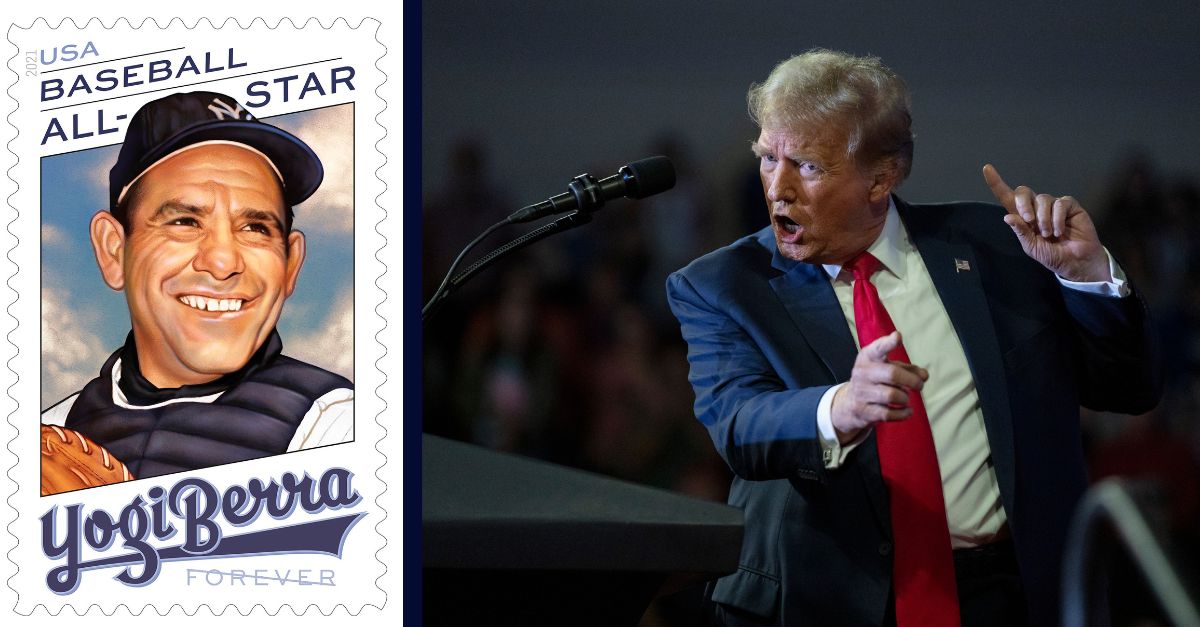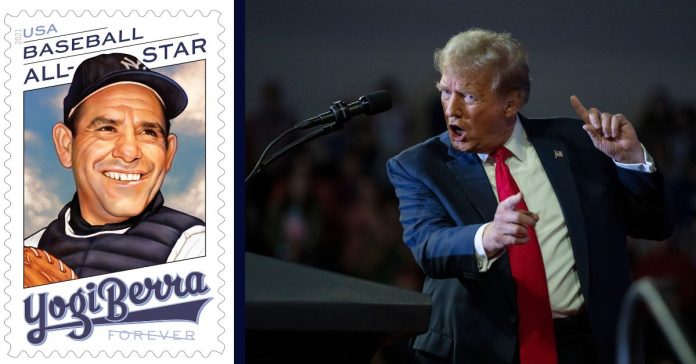
Left: This handout provided by the United States Postal Service shows the Yogi Berra stamp, issued on Thursday, June 24, 2021. (United States Postal Service via AP) Right: Republican presidential candidate former President Donald Trump speaks at a Get Out The Vote rally at Coastal Carolina University in Conway, S.C., Saturday, Feb. 10, 2024. (AP Photo/Manuel Balce Ceneta)
Former President Donald Trump on Monday afternoon asked the U.S. Supreme Court to put a pause on a recent appellate court ruling rejecting his claim that he is immune from criminal prosecution over the pro-Trump riots at the U.S. Capitol Complex on Jan. 6, 2021.
“Without immunity from criminal prosecution, the Presidency as we know it will cease to exist,” the application for a stay pending the filing of a petition for writ of certiorari argues.
The 45th president’s argument is largely pinned on procedural maneuvering — asking for an indefinite kibosh while defense attorneys prepare, and then file, an appeal directly with the nation’s high court.
Procedure is also the key argument advanced in the stay application.
Last week, a three-judge panel on the U.S. Court of Appeals for the District of Columbia unanimously ruled Trump does not have presidential immunity from prosecution on charges that he criminally conspired to overturn the results of the 2020 presidential election.
The upshot of that decision, Trump’s stay application claims, is that U.S. District Judge Tanya Chutkan could receive the appellate court’s mandate “in four business days if President Trump did not file an application in [the Supreme] Court to stay the mandate in that time.”
All that potential law and order, the former president argues in his eleventh-hour stay application, is simply too much, too fast. And, Trump claims, there is a familiar bit of legal whiplash in the case.
The bid to pause the criminal proceedings opens with a quote by legendary New York Yankees, and New York Mets, catcher, Yogi Berra.
“This application is ‘déjà vu all over again,”” the 110-page filing by Trump’s attorneys reads.
The filing references an earlier failed effort by special counsel Jack Smith to force the nine justices’ hands and issue a preemptive decision on Trump’s “absolute immunity” claims before the appeals court could review and rule on the issue.
“Two months ago, after the district court denied President Trump’s claim of Presidential immunity in this criminal case, the Special Counsel filed a petition for certiorari before judgment asking this Court to undertake an extraordinary departure from ordinary appellate procedures and decide the vital and historic question of Presidential immunity on a hyper-accelerated basis,” the stay application recalls. “This Court correctly chose to follow standard judicial process and declined to do so.”
Now, Trump argues, because Smith’s efforts to resolve the issue are the impetus behind the appeals court’s per curiam immunity denial, which occurred “in an extraordinarily fast manner,” the Supreme Court should once again rule in the ex-president’s favor.
“This Court should stay the D.C. Circuit’s mandate to forestall, once again, an unprecedented and unacceptable departure from ordinary appellate procedures and allow President Trump’s claim of immunity to be decided in the ordinary course of justice,” the application argues.
Trump’s application says Smith cited only the “imperative public importance of a prompt resolution” of the case when arguing and winning the denial of Trump’s immunity claim before the D.C. Circuit panel — and the subsequent almost-immediate return back to Chutkan’s court.
“In the Court of Appeals, as here, the Special Counsel never explains why it is so ‘imperative’ that this case proceed to trial immediately, forestalling ordinary en banc review and even this Court’s review procedures,” the application goes on. “The prospect that an interlocutory appeal of an immunity question might affect a pending trial date is commonplace and routine.”
In the underlying case, Smith is prosecuting Trump on four criminal counts, including conspiracy to defraud the United States, conspiracy to obstruct the U.S. Congress, and conspiracy against rights.
Have a tip we should know? [email protected]

